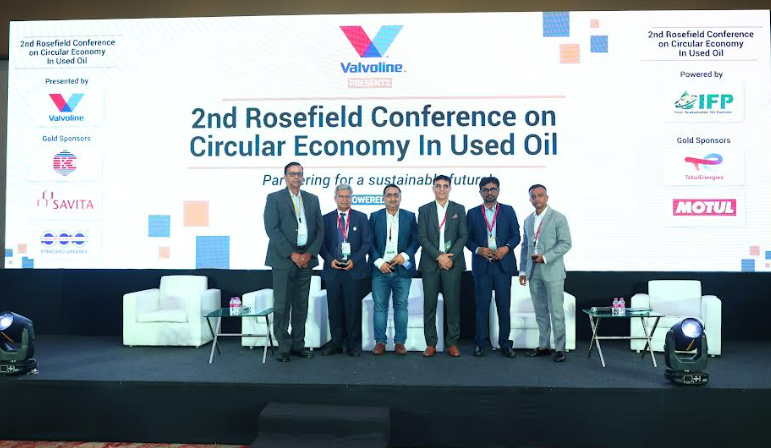
Mumbai: The immense economic and environmental benefits of used oil were brought to the fore at the recently-held second Rosefield Conference on Circular Economy in Used Oil in Mumbai.
The idea of a circular economy by uniting key players to tackle the logistical, technical and infrastructural challenges in collecting and re-refining used oil were emphasised by the various speakers at the conference organised by Rosefield Energy Tech (RET) in association with the Center for Environment Education (CEE).
The organisers brought together representatives from multiple sectors, including Lubricants, Energy, Auto OEMs, Government Organizations and Re-refiners and conducted a holistic discourse around the topic. . The involvement of executive and senior leadership from companies in these sectors infused the discussions with profound insights.
In the inaugural session, Kartikeya Sarabhai, Founder of CEE, said that Circular Economy initiatives are focused on job creation and economic growth.
Suresh Londhe, the Joint Director of Industries, government of Maharashtra, underscored the government’s novel Circular Economy policy, contribution to GDP of up to 10% and the necessity for sustainable growth.
Hem Pande, Former Secretary, MoEFCC, recognised the need for effective policy execution and a shift from shareholders to stakeholders.
Ramakrishnan, Global Head of Customer Care, Tata Motors, brought to attention the state of the planet and TATA Motor’s ambitious goal of achieving net-zero carbon by 2045.
The first session delved into the conference’s theme, where Sandeep Kalia, MD of Valvoline Cummins, ly spoke about the benefits of producing products with a Re-refined base oil (RRBO), a practice the company has implemented globally since 2010. He insisted on the quality standards of RRBOs and underscored the crucial role played by policymakers and Auto OEMs in adopting lubricants blended with RRBO.
The landscape of Used Oil re-refining in India was analyzed by Sanjay Kumar, ED of HPCL, with a noteworthy point that even today, more than 50% – 60% of Used Oil is being reused but for different applications. He highlighted the crucial issue of obtaining high-quality RRBOs, urging competitors to set aside their differences and unite to overcome collection, reverse logistics and technology challenges.
Shakilur Rehman, CEO at TOTALEnergies, made a compelling case for the broad use of RRBOs, citing examples from TOTAL France. Similarly, Kapil Vyas, Director at Standard Greases & Specialities, urged to integrate the unorganized sector of Used Oil collectors into the formal economy given that no drop of Used Oil goes to waste.
The subsequent session examined the challenges for Auto OEMs concerning RRBOs. Ramakrishnan exuded confidence that being the largest generator of Used Oil in the country, TATA Motors will be able to mandate its franchised workshops collect, record and supply Used Oil back to the authorized agencies through the same logistics channel that supplies Fresh Oil.
Sukhdeep Kochar of Mahindra stressed on the economic benefits to end consumers and to position the RRBO based Lubes as another option for consumers to buy. . Gautam Mehra, MD at Savita Oil Technologies, identified the absence of standards and regulations in RRBO as a significant concern. He also mentioned the need for modern technologies like hydro-treating to make Group II Base Oil from Used Oil, which requires substantial capital investment and suggesting government support to bolster the re-refining.
The highlight of the conference was the enlightening session on the existing and emerging technologies for RRBOs. . Sahil Bhargava from IFP Petro posed the world and industry’s age-old chicken-n-egg problem, viz., the interdependence of collection & technology and supply and demand. Marc from Avista Oil (Germany) offered insights into the cost-efficient solvent refining technologies. At the same time, Fabio from Technoilogy (Italy) shed light on the success of hydrogenation technology in Europe.
The integration of the informal sector then took center-stage with a presentation by Sodhi of CEE. The importance of the informal waste collectors & independent mechanics/workshops was emphasized, along with the necessity for a systematic approach to integrating them into the formal sector. Ideas regarding the registration of collectors, training, traceability, transparency and the passing of economic benefits to the lowest level of collectors were discussed.
The conference’s concluding session outlined prospective logistics strategies. Sanjay Awasthi from Valvoline Cummins and Mayank Pandey – Wholetime Director at Castrol, diligently examined the obstacles in harnessing the full potential of the existing re-refining capacity. They also raised pertinent questions about the feasibility of lubricant manufacturers acting as collection agencies. Prashant Banerjee, Executive Director of the Society of Indian Automobile Manufacturers (SIAM), underscored the significance of circularity for the automotive industry. Sudhir Kumar, a pivotal figure in the implementation of Extended Producer Responsibility (EPR) for Used Oil, provided a comprehensive explanation of the complexities of EPR to the assembled industry leaders. The CEO of IFP Petro, Anant Bhargava, examined the viability gap of Reverse Logistics and ways of improving collection.
The conference was a significant step in bringing Circular Economy principles into the mainstream, with industry leaders recognising the urgent need for a collaborative and concerted approach. The conference’s partnership announcement between IFP Petro Products and Avista Oil gave a promising glimpse into future collaborations and advancements in this field.
In brief, the 2nd Rosefield Conference on Circular Economy in Used Oil successfully provided an impetus to the idea of a Circular Economy, uniting key players to tackle the logistical, technical and infrastructural challenges while highlighting the immense potential that lies in the re-refining of oil. It effectively reinforced the mantra that the best way to predict the future is to create it, and with this, a greener, sustainable future seems within our grasp.
(ET Auto was the media partner of the conference)

